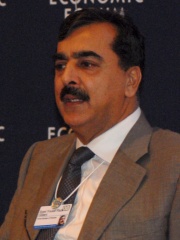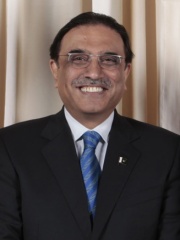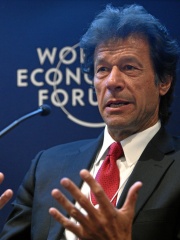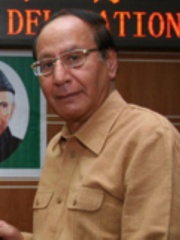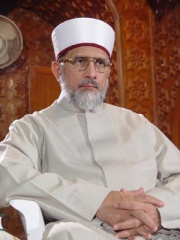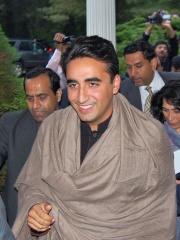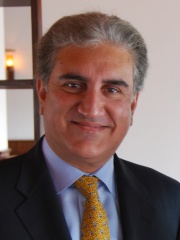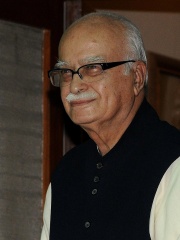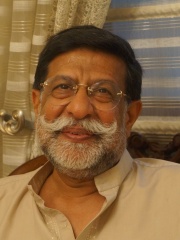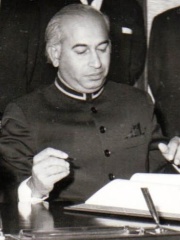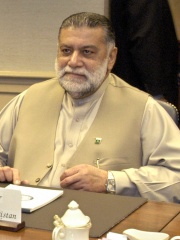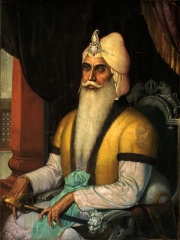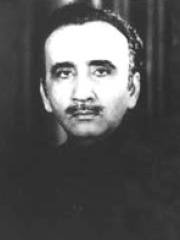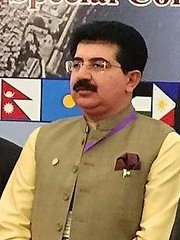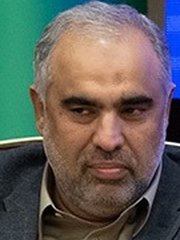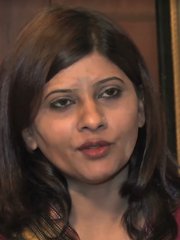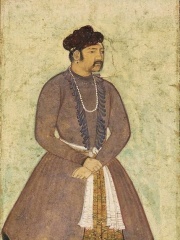
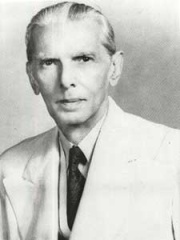
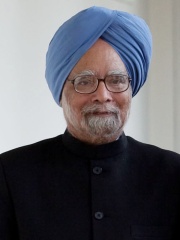
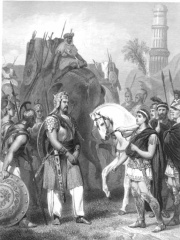
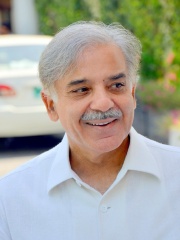
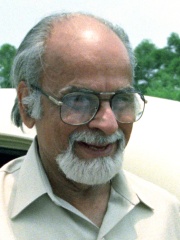
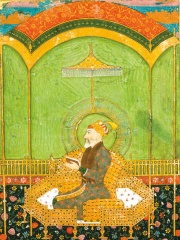
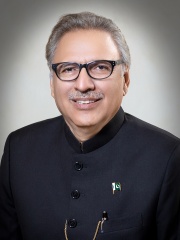
The Most Famous
POLITICIANS from Pakistan
This page contains a list of the greatest Pakistani Politicians. The pantheon dataset contains 19,576 Politicians, 65 of which were born in Pakistan. This makes Pakistan the birth place of the 53rd most number of Politicians behind Belarus, and Thailand.
Top 10
The following people are considered by Pantheon to be the top 10 most legendary Pakistani Politicians of all time. This list of famous Pakistani Politicians is sorted by HPI (Historical Popularity Index), a metric that aggregates information on a biography's online popularity. Visit the rankings page to view the entire list of Pakistani Politicians.

1. Akbar (1542 - 1605)
With an HPI of 92.19, Akbar is the most famous Pakistani Politician. His biography has been translated into 153 different languages on wikipedia.
Akbar (Jalal-ud-Din Muhammad Akbar, (1542-10-15)15 October 1542 – (1605-10-27)27 October 1605), also known as Akbar the Great, was the third Mughal emperor, who reigned from 1556 to 1605. Akbar succeeded his father, Humayun, under a regent, Bairam Khan, who helped the young emperor expand and consolidate Mughal domains in the Indian subcontinent. He is generally considered one of the greatest emperors in Indian history and led a successful campaign to unify the various kingdoms of Hindūstān or India proper. Akbar gradually enlarged the Mughal Empire to include much of the Indian subcontinent through Mughal military, political, cultural, and economic dominance. To unify the vast Mughal state, Akbar established a centralised system of administration and adopted a policy of conciliating conquered rulers through marriage and diplomacy. To preserve peace and order in a religiously and culturally diverse empire, he adopted policies that won him the support of his non-Muslim subjects, including abolishing the sectarian tax and appointing them to high civil and military posts. Under Akbar, Mughal India developed a strong and stable economy, which tripled in size and wealth, leading to commercial expansion and greater patronage of an Indo-Persian culture. Akbar's courts at Delhi, Agra, and Fatehpur Sikri attracted holy men of many faiths, poets, architects, and artisans, and became known as centres of the arts, letters, and learning. Timurid and Perso-Islamic culture began to merge and blend with indigenous Indian elements into a distinct style of Mughal arts, including painting and architecture. Disillusioned with orthodox Islam and perhaps hoping to bring about religious unity within his empire, Akbar promulgated Din-i Ilahi, a syncretic creed derived mainly from Islam and Hinduism as well as elements of Zoroastrianism and Christianity. Akbar was succeeded as emperor by his son, Prince Salim, later known as Jahangir.

2. Muhammad Ali Jinnah (1876 - 1948)
With an HPI of 86.88, Muhammad Ali Jinnah is the 2nd most famous Pakistani Politician. His biography has been translated into 99 different languages.
Muhammad Ali Jinnah (born Mahomedali Jinnahbhai; 25 December 1876 – 11 September 1948) was a barrister, politician, and the founder of Pakistan. Jinnah served as the leader of the All-India Muslim League from 1913 until the inception of Pakistan on 14 August 1947 and then as Pakistan's first governor-general until his death a year later in 1948. He is known as Quaid-e-Azam (meaning "Greatest Leader") in Pakistan. Born at Wazir Mansion in Karachi, Jinnah was trained as a barrister at Lincoln's Inn in London, England. Upon his return to India, he enrolled at the Bombay High Court, and took an interest in national politics, which eventually replaced his legal practice. Jinnah rose to prominence in the Indian National Congress in the first two decades of the 20th century. In these early years of his political career, Jinnah advocated for Hindu–Muslim unity, helping to shape the 1916 Lucknow Pact between the Congress and the All-India Muslim League, in which Jinnah had also become prominent. Jinnah became a key leader in the All-India Home Rule League, and proposed a fourteen-point constitutional reform plan to safeguard the political rights of Muslims in the Indian subcontinent. In 1920, however, Jinnah resigned from the Congress when it agreed to follow a campaign of satyagraha, which he regarded as political anarchy. After joining the All-India Muslim League, Jinnah worked for the rights of Muslims in the subcontinent to protect them from the threat of marginalisation in a Hindu-dominated state. In 1940, the Muslim League, led by Jinnah, passed the Lahore Resolution. During the Second World War, the League gained strength while leaders of the Congress were imprisoned, and in the provincial elections held shortly after the war, it won most of the seats reserved for Muslims. Ultimately, the Congress and the Muslim League could not reach a power-sharing formula that would allow the entirety of British India to be united as a single state following independence, leading all parties to agree instead to the independence of a Hindu-majority India, and for a predominantly Muslim state of Pakistan. As the first governor-general of Pakistan, Jinnah worked to establish the government of the new nation and policies to aid the millions of Muslim migrants who had emigrated from regions that became part of the Dominion of India to Pakistan after the independence of both states, personally supervising the establishment of refugee camps. Jinnah died at age 71 in September 1948, just over a year after Pakistan gained independence from the United Kingdom. He left a deep and respected legacy in Pakistan. Several universities and public buildings in Pakistan bear Jinnah's name. He is revered in Pakistan as the Quaid-e-Azam ("Great Leader") and Baba-e-Qaum ("Father of the Nation"). His birthday is also observed as a national holiday in the country. According to his biographer, Stanley Wolpert, Jinnah remains Pakistan's greatest leader.

3. Manmohan Singh (1932 - 2024)
With an HPI of 82.56, Manmohan Singh is the 3rd most famous Pakistani Politician. His biography has been translated into 100 different languages.
Manmohan Singh (26 September 1932 – 26 December 2024) was an Indian economist, statesman and politician who served as the prime minister of India from 2004 to 2014. He was the fourth longest-serving prime minister after Jawaharlal Nehru, Indira Gandhi, and Narendra Modi. A member of the Indian National Congress, Singh was the first and remains the only Sikh prime minister of India. He was also the first prime minister since Nehru to be re-appointed after completing a full five-year term. Born in Gah in what is today Pakistan, Singh's family migrated to India during its partition in 1947. After obtaining his doctorate in economics from the University of Oxford, Singh worked for the United Nations during 1966–1969. He subsequently began his bureaucratic career when Lalit Narayan Mishra hired him as an advisor in the Ministry of Commerce and Industry. During the 1970s and 1980s, Singh held several key posts in the Government of India, such as Chief Economic Advisor (1972–1976), governor of the Reserve Bank (1982–1985) and head of the Planning Commission (1985–1987). In 1991, under prime minister, P. V. Narasimha Rao, Singh was appointed as finance minister. Over the next few years, despite strong opposition, he carried out several structural reforms that liberalised India's economy. It enhanced Singh's reputation globally as a leading reform-minded economist. Subsequently, Singh was leader of the opposition in the Rajya Sabha (the upper house of the Parliament of India) during the Atal Bihari Vajpayee government of 1998–2004. In 2004, when the Congress-led United Progressive Alliance (UPA) came to power, its chairperson Sonia Gandhi unexpectedly relinquished the prime ministership to Singh. His first ministry executed several key legislations and projects, including the National Rural Health Mission, Unique Identification Authority, Rural Employment Guarantee scheme and Right to Information Act. In 2008, opposition to a historic civil nuclear agreement with the United States nearly caused Singh's government to fall after Left Front parties withdrew their support. The 2009 general election saw the UPA return with an increased mandate, with Singh retaining the office of prime minister. In 2009, BRICS was established with India as one of the founding members. His coalition's second term was marked by political scandals. Singh opted out of the race for the office of prime minister during the 2014 Indian general election. Singh served as a member of the Rajya Sabha, representing the state of Assam from 1991 to 2019 and Rajasthan from 2019 to 2024.

4. Porus (400 BC - 316 BC)
With an HPI of 79.63, Porus is the 4th most famous Pakistani Politician. His biography has been translated into 50 different languages.
Porus or Puru (Ancient Greek: Πῶρος Pôros; fl. 326–321 BC) was an ancient Indian king whose territory spanned the region between the Jhelum River (Hydaspes) and Chenab River (Acesines) in the Punjab region. He is only mentioned in Greek sources. Said to be a warrior with exceptional skills, Porus unsuccessfully fought against Alexander the Great in the Battle of the Hydaspes (326 BC). Alexander spared his life and not only reinstated him as his satrap but also granted him dominion over lands to the south-east extending as far as the Hyphasis (Beas). Porus reportedly died sometime between 321 and 315 BC.
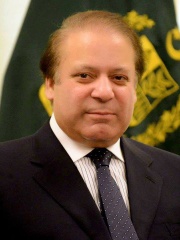
5. Nawaz Sharif (b. 1949)
With an HPI of 79.46, Nawaz Sharif is the 5th most famous Pakistani Politician. His biography has been translated into 73 different languages.
Mian Muhammad Nawaz Sharif (born 25 December 1949) is a Pakistani politician and businessman who served as the 12th prime minister of Pakistan for three non-consecutive terms, first serving from 1990 to 1993, then from 1997 to 1999 and later from 2013 to 2017. He is the longest-serving prime minister in the country's history, having served a total of more than 9 years across three tenures, with each term ending in his ousting. Born into the upper-middle-class Sharif family in Lahore, Punjab, Nawaz is the son of Muhammad Sharif, the founder of Ittefaq and Sharif groups. Nawaz studied business at Government College and law at the University of Punjab. Nawaz entered into politics in 1981, when he was appointed by President Zia as the minister of finance for the province of Punjab. Backed by a loose coalition of conservatives, Nawaz was elected as the chief minister of Punjab in 1985 and re-elected after the end of martial law in 1988. After the 1990 election, Nawaz was appointed as the head of the conservative Islami Jamhuri Ittihad, founded by Hamid Gul, and became the 12th prime minister of Pakistan with the help of General Mirza Aslam Beg and Asad Durrani. After being ousted in 1993, when President Ghulam Ishaq Khan dissolved the National Assembly, Nawaz served as the leader of the opposition to the government of Benazir Bhutto from 1993 to 1996. He returned to the premiership after the Pakistan Muslim League (N) (PML-N) was elected in 1997, and served until his removal in 1999 by military takeover by General Pervez Musharraf. Imprisoned and subject to trial after the coup, Sharif avoided the death penalty as a result of pressure from US president Bill Clinton. He struck a deal with , which was brokered by King Fahd of Saudi Arabia, and went into exile for a period of ten years. In 2007, he violated the agreement and attempted to return to Pakistan but was deported. After more than a decade, he returned to politics in 2011 and led his party to victory for the third time in 2013. In 2017, Nawaz was again removed from office by the Supreme Court of Pakistan following the Panama Papers case. In 2018, the Pakistani Supreme Court disqualified Nawaz from holding public office, and he was also sentenced to ten years in prison by an accountability court. In 2019, he moved to London for medical treatment on bail. He was also declared an absconder by a Pakistani court; however, the Islamabad High Court later granted him protective bail in the Avenfield and Al-Azizia cases. In 2023, after four years of exile, he returned to Pakistan and was subsequently acquitted in the Avenfield and Al-Azizia Steel Mills cases by the Islamabad High Court. He has been a member of the National Assembly of Pakistan since 29 February 2024. Sharif's victory in NA-130, which is widely regarded as one of Pakistan's most competitive constituencies, has been called into question. An examination of Form 45 conducted by the Pattan Development Organisation and an investigation by Geo TV's Election Cell showed manipulated vote counts, altered turnout statistics, and modified official documents which substantiated claims by the opposition that the election result was tampered with. The evidence suggests the election was rigged in Sharif's favour, undermining the legitimate victory of his opponent Yasmin Rashid. He has been serving as Patron-in-Chief of the Lahore Heritage Revival Authority since 16 March 2025.

6. Shehbaz Sharif (b. 1951)
With an HPI of 78.79, Shehbaz Sharif is the 6th most famous Pakistani Politician. His biography has been translated into 63 different languages.
Mian Muhammad Shehbaz Sharif (born 23 September 1951) is a Pakistani politician and businessman who has served as the 20th prime minister of Pakistan since March 2024, having previously been in the role between April 2022 to August 2023. He has also served as the president of the Pakistan Muslim League (N) and chief minister of Punjab three times, making him the longest-serving person in the role. Sharif was elected to the Punjab Assembly in 1988 and to the National Assembly of Pakistan in 1990. He was re-elected to the Punjab Assembly in 1993 and appointed leader of the opposition. He was elected as chief minister of Pakistan's most populous province, Punjab, for the first time on 20 February 1997. After the 1999 Pakistani coup d'état, Sharif, along with his family, spent years of self-exile in Saudi Arabia, returning to Pakistan in 2007. Sharif was appointed chief minister for a second term after the PML(N)'s victory in Punjab in the 2008 Pakistani general election. He was elected as chief minister of Punjab for the third time after the 2013 Punjab provincial election and served his term until his party's defeat in the 2018 Punjab provincial election. Sharif was nominated as the president of the PML(N) after his brother, Nawaz Sharif, was disqualified from holding office in the wake of the Panama Papers case. He was nominated as the leader of the opposition after the 2018 general election, and elected prime minister in 2022 after the no-confidence motion against Imran Khan was passed in the National Assembly. After the PML(N) won a minority in the 2024 general election, Sharif became prime minister with a coalition government.

7. I. K. Gujral (1919 - 2012)
With an HPI of 75.79, I. K. Gujral is the 7th most famous Pakistani Politician. His biography has been translated into 50 different languages.
Inder Kumar Gujral (4 December 1919 – 30 November 2012) was an Indian diplomat, politician, and anti-colonial independence activist, who served as prime minister of India from April 1997 to March 1998. Born in Punjab, he was influenced by nationalistic ideas as a student, and joined the All India Students Federation and the Communist Party of India. He was imprisoned for taking part in the Quit India movement. After independence, he joined the Indian National Congress party in 1964, and became a Member of Parliament in the Rajya Sabha. He was the Minister of Information and Broadcasting during the emergency. In 1976, he was appointed as the Ambassador of India to the Soviet Union. In 1996, he became the Minister of External Affairs in the Deve Gowda ministry, and developed the Gujral doctrine during this period. He was appointed the prime minister of India in 1997. His tenure lasted for less than a year. He retired from all political positions in 1998. He died in 2012 at the age of 92, following hospitalization due to a lung infection.

8. Shah Jahan (1592 - 1666)
With an HPI of 75.28, Shah Jahan is the 8th most famous Pakistani Politician. His biography has been translated into 92 different languages.
Shah Jahan I (Shahab-ud-Din Muhammad Khurram; 5 January 1592 – 22 January 1666), also called Shah Jahan the Magnificent, was the fifth Mughal Emperor from 1628 until his deposition in 1658. His reign marked the zenith of Mughal architectural and cultural achievements. The third son of Jahangir (r. 1605–1627), Shah Jahan participated in the military campaigns against the Sisodia Rajputs of Mewar and the rebel Lodi nobles of the Deccan. After Jahangir's death in October 1627, Shah Jahan defeated his youngest brother Shahryar Mirza and crowned himself emperor in the Agra Fort. In addition to Shahryar, Shah Jahan executed most of his rival claimants to the throne. He commissioned many monuments, including the Red Fort, Shah Jahan Mosque and the famous Taj Mahal, where his favorite consort Mumtaz Mahal is entombed. In foreign affairs, Shah Jahan presided over the aggressive campaigns against the Deccan sultanates, the conflicts with the Portuguese, and the wars with the Safavids. He also suppressed several local rebellions and dealt with the devastating Deccan famine of 1630–1632. In September 1657, the ailing Shah Jahan appointed his eldest son Dara Shikoh as his successor. This led to the Mughal war of succession (1658–1659) between his three sons, with Aurangzeb (r. 1658–1707) emerging victorious and becoming the sixth emperor, and executing all of his surviving brothers, including the Crown Prince Dara Shikoh. After Shah Jahan recovered from his illness in July 1658, Aurangzeb had him imprisoned inside the Agra Fort from July 1658 until his death in January 1666. He was laid to rest next to his wife in the Taj Mahal. His reign is known for abandoning the liberal policies initiated by his grandfather Akbar. During Shah Jahan's time, Islamic revivalist movements like the Naqshbandi began to shape Mughal policies.

9. Arif Alvi (b. 1949)
With an HPI of 73.02, Arif Alvi is the 9th most famous Pakistani Politician. His biography has been translated into 53 different languages.
Arif-ur-Rehman Alvi (born 29 July 1949) is a Pakistani politician and former dentist who served as the 13th president of Pakistan from September 2018 to March 2024. He was a member of the National Assembly from 2013 until being elected president in 2018. Alvi entered politics in 1979 by joining Jamaat-e-Islami, but later resigned and became one of the founding members of the Pakistan Tehreek-e-Insaf. Alvi was elected to the National Assembly, from NA-250 Karachi-XII in 2013 and was re-elected in 2018 from NA-247 Karachi South-II. He was later nominated as the PTI's candidate for the presidential election. He was elected as the 13th President of Pakistan after defeating Fazal-ur-Rehman and Aitzaz Ahsan, after which he resigned from the National Assembly and was sworn into office on 9 September 2018, succeeding Mamnoon Hussain.
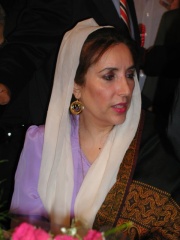
10. Benazir Bhutto (1953 - 2007)
With an HPI of 72.02, Benazir Bhutto is the 10th most famous Pakistani Politician. Her biography has been translated into 123 different languages.
Benazir Bhutto (21 June 1953 – 27 December 2007) was a Pakistani politician and stateswoman who served as the 11th prime minister of Pakistan from 1988 to 1990, and again from 1993 to 1996. She was the first woman elected to head a democratic government in a Muslim-majority country. Ideologically a liberal and a secularist, she chaired or co-chaired the Pakistan People's Party (PPP) from the early 1980s until her assassination in 2007. Of Sindhi, Persian and Kurdish parentage, Bhutto was born in Karachi to the politically-significant aristocratic Bhutto family. She studied at Harvard University and the University of Oxford, where she served as President of the Oxford Union. She returned to Pakistan in 1977 during her father Zulfikar Ali Bhutto's socialist government, shortly before her father was ousted in a military coup and later executed. Bhutto and her mother, Nusrat Bhutto, took control of the PPP and led the country's Movement for the Restoration of Democracy (MRD). Bhutto was repeatedly imprisoned by Zia-ul-Haq's military government and self-exiled to Great Britain in 1984. She returned in 1986 and — influenced by Thatcherite economics — transformed the PPP's platform from a socialist to a liberal one, before leading it to victory in the 1988 election. As prime minister, her attempts at reform were stifled by conservative and Islamist forces within the country, including President Ghulam Ishaq Khan and the Pakistani military. Her administration, having been accused of corruption and nepotism, was dismissed by Khan in 1990 with the following election being rigged by Intelligence services to ensure a victory for the conservative Islamic Democratic Alliance (IJI), at which point Bhutto became the Leader of the Opposition. After the IJI government of prime minister Nawaz Sharif was also dismissed on corruption charges, Bhutto once again led the PPP to victory in the 1993 elections. In her second term, she oversaw economic privatisation and attempts to advance women's rights. Her government was beset with instability, including the assassination of her brother Murtaza, a failed coup d'état in 1995, and a bribery scandal involving her and her husband Asif Ali Zardari; in response, President Farooq Leghari dismissed her government, following which the PPP incurred a historic defeat in the 1997 election, and in 1998 she went into self-exile once more, living between Dubai and London for the next decade. A widening corruption inquiry culminated in a 2003 conviction in a Swiss court. Following the United States–brokered negotiations with Pakistani President Pervez Musharraf, she returned to Pakistan in 2007 to run in the 2008 elections. Her platform emphasised civilian oversight of the military and opposition to growing Islamist violence. After a political rally in Rawalpindi, she was assassinated in December 2007. The Salafi jihadist militant group al-Qaeda claimed responsibility, although involvement of the Pakistani Taliban and rogue elements of the intelligence services were also hypothesised. She was buried at her family mausoleum in Garhi Khuda Bakhsh. Opinions on Bhutto were deeply divided. Pakistan's Islamist groups and conservative forces often accused her of being politically inexperienced, corrupt, and opposed her secularist, modernising agenda. In the early years of her career, however, she was nevertheless domestically popular and also attracted support from the international community, being seen as a champion of democracy. Posthumously, she came to be regarded as an icon for women's rights due to her political success in a male-dominated society.
People
Pantheon has 65 people classified as Pakistani politicians born between 550 BC and 1988. Of these 65, 28 (43.08%) of them are still alive today. The most famous living Pakistani politicians include Nawaz Sharif, Shehbaz Sharif, and Arif Alvi. The most famous deceased Pakistani politicians include Akbar, Muhammad Ali Jinnah, and Manmohan Singh. As of April 2024, 4 new Pakistani politicians have been added to Pantheon including Masood Azhar, Sadiq Sanjrani, and Asad Qaiser.
Living Pakistani Politicians
Go to all RankingsNawaz Sharif
1949 - Present
HPI: 79.46
Shehbaz Sharif
1951 - Present
HPI: 78.79
Arif Alvi
1949 - Present
HPI: 73.02
Yousaf Raza Gillani
1952 - Present
HPI: 68.75
Asif Ali Zardari
1955 - Present
HPI: 67.60
Imran Khan
1952 - Present
HPI: 65.38
Shujaat Hussain
1946 - Present
HPI: 62.35
Muhammad Tahir-ul-Qadri
1951 - Present
HPI: 61.81
Bilawal Bhutto Zardari
1988 - Present
HPI: 58.60
Shah Mahmood Qureshi
1956 - Present
HPI: 57.65
L. K. Advani
1927 - Present
HPI: 57.64
Muhammad Mian Soomro
1950 - Present
HPI: 55.93
Deceased Pakistani Politicians
Go to all RankingsAkbar
1542 - 1605
HPI: 92.19
Muhammad Ali Jinnah
1876 - 1948
HPI: 86.88
Manmohan Singh
1932 - 2024
HPI: 82.56
Porus
400 BC - 316 BC
HPI: 79.63
I. K. Gujral
1919 - 2012
HPI: 75.79
Shah Jahan
1592 - 1666
HPI: 75.28
Benazir Bhutto
1953 - 2007
HPI: 72.02
Zulfikar Ali Bhutto
1928 - 1979
HPI: 69.00
Aga Khan III
1877 - 1957
HPI: 68.62
Zafarullah Khan Jamali
1944 - 2020
HPI: 68.45
Ranjit Singh
1780 - 1839
HPI: 67.02
Muhammad Khan Junejo
1932 - 1993
HPI: 66.55
Newly Added Pakistani Politicians (2025)
Go to all RankingsMasood Azhar
1968 - Present
HPI: 43.47
Sadiq Sanjrani
1970 - Present
HPI: 41.56
Asad Qaiser
1969 - Present
HPI: 35.61
Krishna Kohli
1979 - Present
HPI: 29.49
Overlapping Lives
Which Politicians were alive at the same time? This visualization shows the lifespans of the 25 most globally memorable Politicians since 1700.

